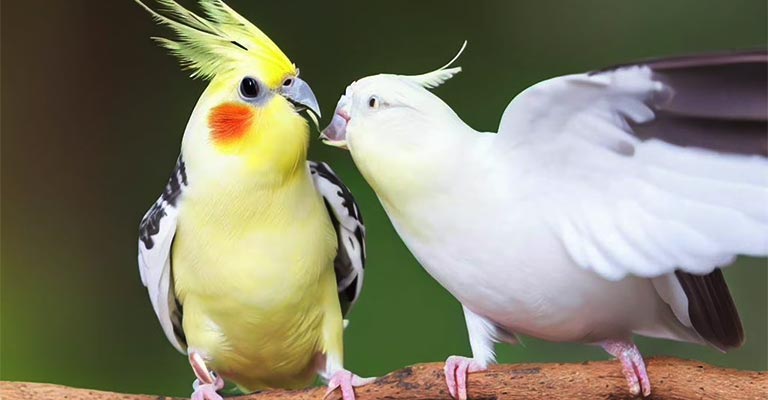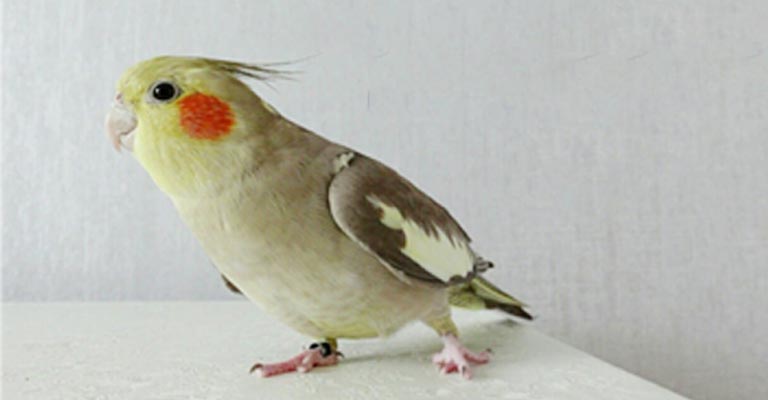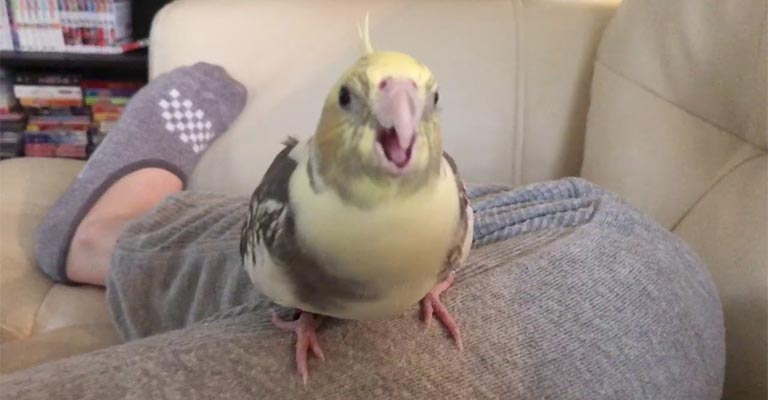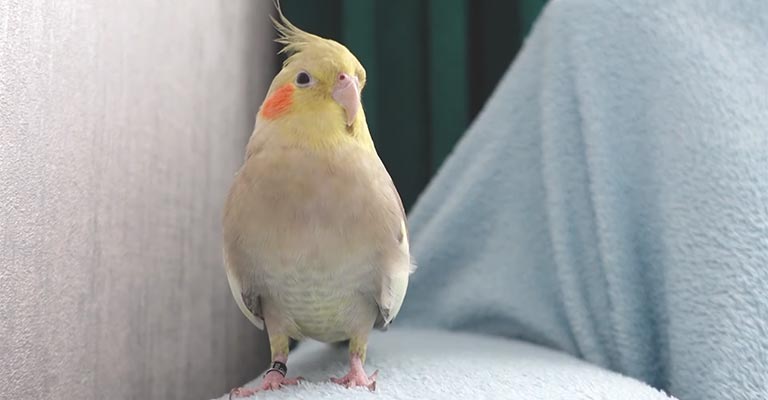The sudden onset of aggression in a typically friendly and sociable pet like a cockatiel can be disconcerting for any bird owner. These charming birds are known for their affectionate nature, but they can exhibit aggressive behavior due to various factors.
Understanding why is my cockatiel suddenly aggressive is crucial for addressing the issue and ensuring your pet’s well-being.
This article delves into the potential reasons behind a cockatiel’s sudden aggression, shedding light on factors such as hormonal changes, health issues, environmental stress, and more.
By comprehending the root causes, you can take appropriate steps to manage and, in many cases, alleviate this behavior.

Why Is My Cockatiel Suddenly Aggressive?
Cockatiels are generally known for their friendly and sociable nature, but they can exhibit sudden aggression for various reasons. Here are some potential causes for this behavior:
Hormonal Changes
During the breeding season, cockatiels can experience hormonal fluctuations, leading to territorial and protective behaviors. This may manifest as aggression, especially if they perceive you as a potential threat to their nesting area or mate.
Illness or Pain
Discomfort or pain can make a typically friendly cockatiel irritable and aggressive. If your bird is unwell, it may lash out in an attempt to protect itself or as a reaction to physical discomfort.
Environmental Stress
Changes in their environment, such as a move to a new cage, the introduction of a new pet, or loud noises, can trigger stress and, subsequently, aggression. Cockatiels may respond aggressively when they feel threatened or anxious.
Lack of Socialization

A lack of socialization or interaction with their human companions can lead to territorial aggression. Cockatiels thrive on social bonds, and if they don’t receive enough attention, they may become aggressive in defense of their personal space.
Fear or Trauma
Past traumatic experiences or exposure to frightening situations can trigger aggressive behavior. If your cockatiel has had negative encounters or suffered harm, it may respond with aggression as a form of self-defense.
Molting
During molt, cockatiels might experience discomfort or heightened sensitivity in their feathers. This physical discomfort can make them more prone to aggression, as they may react defensively when touched.
Lack of Mental Stimulation
Boredom and lack of mental stimulation can lead to frustration and aggression. Cockatiels are intelligent birds that need mental engagement to stay happy. Providing toys, puzzles, and regular interaction can prevent boredom-related aggression.
Understanding the specific cause of your cockatiel’s sudden aggression is vital for addressing the issue effectively.
If you observe aggressive behavior, especially when accompanied by other concerning signs, it’s advisable to consult with an avian veterinarian or a professional bird behaviorist to determine the cause and develop a suitable treatment plan.
What To Do When My Cockatiel Is Suddenly Aggressive?

Dealing with a suddenly aggressive cockatiel can be challenging, but with patience and understanding, you can help address the issue and restore a harmonious relationship.
Here are some tips on what to do when your cockatiel is suddenly aggressive:
Observe Triggers and Avoid Them
Pay close attention to the situations or stimuli that trigger aggression in your cockatiel. Avoid these triggers whenever possible. Identifying and eliminating sources of stress can significantly reduce aggressive behavior.
Respect their space
Give your cockatiel space and time to calm down if it’s displaying aggressive behavior. Trying to force interaction during these moments can escalate the aggression. Allow your bird to retreat to its cage or a safe space until it feels more comfortable.
Provide Mental and Physical Stimulation
Boredom can contribute to aggression. Offer a variety of toys, puzzles, and activities to keep your cockatiel mentally and physically stimulated. Rotate toys regularly to maintain their interest and prevent monotony.
Positive Reinforcement
Reward calm and non-aggressive behavior with treats, praise, or attention. Positive reinforcement can help your cockatiel associate good behavior with positive outcomes, encouraging them to exhibit desirable actions.
Establish Trust Through Training
Training sessions can strengthen your bond with your cockatiel and build trust. Use positive reinforcement techniques like clicker training to encourage good behavior.
Training not only provides mental stimulation but also helps establish a sense of security between you and your bird.
Regular Socialization
Spend quality time with your cockatiel in a calm and quiet environment. Socialize with gentle interactions, talking softly, and offering treats. Regular positive interactions can help rebuild trust and reduce aggression over time.
Consult with a Professional
If the aggression persists or escalates, consider seeking guidance from an avian veterinarian or a professional bird behaviorist.
They can assess the situation, provide tailored advice, and offer effective training techniques to address the specific causes of aggression in your cockatiel.
Remember that patience and consistency are key when dealing with aggressive behavior.
Every cockatiel is unique, so understanding your bird’s specific triggers and responses will help you implement the most appropriate strategies for a positive and peaceful relationship.
How To Discipline An Aggressive Cockatiel?

Disciplining an aggressive cockatiel requires patience, consistency, and positive reinforcement techniques. Here are some ways to address aggression in your pet bird:
Identify Triggers
Observe your cockatiel to identify specific situations or stimuli that trigger aggression. Understanding the triggers allows you to avoid or manage them effectively, minimizing the likelihood of aggressive behavior.
Stay Calm and Confident
Maintain a calm demeanor when interacting with your cockatiel, even in the face of aggression. Birds can sense fear or tension, which might escalate the situation. Stay confident yet gentle to help your bird feel secure around you.
Positive Reinforcement
Use positive reinforcement to encourage desirable behavior. Reward your cockatiel with treats, praise, or gentle petting when it displays calm and non-aggressive actions.
Positive reinforcement creates a positive association and encourages your bird to behave appropriately.
Consistent Training
Implement consistent training routines to establish boundaries and reinforce good behavior. Use clicker training or other positive reinforcement techniques to teach commands and reward compliance. Consistency is crucial in shaping your cockatiel’s behavior over time.
Time-Outs
When your cockatiel becomes aggressive, consider implementing short time-outs. Place the bird in its cage for a few minutes without any interaction. This break can help your cockatiel calm down and understand that aggression leads to a loss of social interaction.
Avoid Negative Reinforcement
Avoid using negative reinforcement methods like yelling, punishment, or physical force. These tactics can create fear and worsen aggression, making it harder to build trust with your cockatiel.
Instead, focus on positive approaches to foster a sense of security and cooperation.
Consult an Avian Expert
If aggression persists despite your efforts, consider seeking help from an avian veterinarian or a professional bird behaviorist.
They can assess the situation, provide tailored advice, and guide you through effective training methods specific to your cockatiel’s needs.
Remember that discipline for birds primarily involves redirection, positive reinforcement, and consistent training.
Building trust and a positive bond with your cockatiel will go a long way in reducing aggression and creating a peaceful environment for both you and your feathered companion.
FAQs
Why is my normally friendly cockatiel suddenly becoming aggressive?
Sudden aggression in cockatiels can result from various factors, including hormonal changes, illness, stress, or even discomfort. Identifying the root cause is crucial to addressing the issue effectively and restoring a harmonious relationship with your pet bird.
Can health issues cause sudden aggression in cockatiels?
Yes, health problems like pain, injury, or underlying illness can trigger aggression in cockatiels. When birds are in discomfort, they may react aggressively as a form of self-protection. A veterinary examination is necessary to rule out or address any health-related issues.
Are there specific triggers for sudden aggression in cockatiels?
Sudden aggression can have various triggers, including changes in the environment, exposure to stressors, hormonal shifts, or even past traumatic experiences. Identifying and addressing these specific triggers is vital for mitigating aggressive behavior.
How can I help my suddenly aggressive cockatiel become more sociable?
To help your cockatiel become less aggressive and more sociable, consider identifying triggers and avoiding them, providing positive reinforcement for good behavior, and offering mental and physical stimulation.
Consistent training and gentle socialization can gradually rebuild trust and reduce aggression.
When should I seek professional help for my aggressive cockatiel?
If your cockatiel’s aggression persists or escalates despite your efforts, it’s advisable to consult with an avian veterinarian or a professional bird behaviorist.
These experts can assess the situation, provide tailored advice, and guide you through effective training methods specific to your cockatiel’s needs, ultimately promoting a positive and harmonious relationship.
Conclusion
The sudden aggression of a cockatiel, a beloved and usually gentle pet, can be a complex issue with various underlying causes.
Whether it’s due to hormonal changes, health concerns, stress, or other factors, addressing this behavior requires patience, understanding, and often professional guidance.
As bird owners, it’s essential to observe your cockatiel’s behavior, identify potential triggers, and provide a supportive environment that minimizes stress.
Addressing sudden aggression involves finding the right balance between positive reinforcement, socialization, and establishing trust.
If your cockatiel’s aggression persists or intensifies, seeking the advice of an avian veterinarian or a professional bird behaviorist is recommended.
These experts can provide tailored strategies and training techniques to address the specific causes of aggression, ultimately helping you and your feathered companion maintain a positive and harmonious relationship.